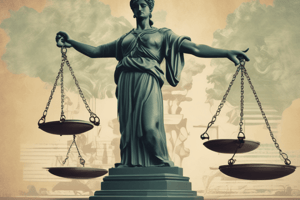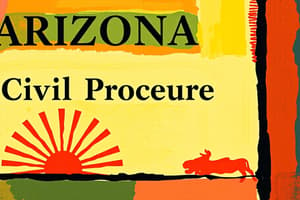Podcast
Questions and Answers
What is the purpose of Rule 11 in civil procedure?
What is the purpose of Rule 11 in civil procedure?
- To establish the effect of failure to plead (correct)
- To specify the kinds of pleadings that can be filed
- To determine the venue of actions
- To outline the general provisions of civil actions
Which rule in civil procedure deals with the filing and service of pleadings?
Which rule in civil procedure deals with the filing and service of pleadings?
- Rule 15
- Rule 13 (correct)
- Rule 14
- Rule 12
What is the general rule regarding the filing of a case in civil procedure?
What is the general rule regarding the filing of a case in civil procedure?
- A case must be filed before the highest court possible
- A case must be filed before the court with the highest jurisdiction
- A case must be filed before the court with the most convenient location
- A case must be filed before the lowest court possible (correct)
Under what circumstances can a case be directly filed before a higher court?
Under what circumstances can a case be directly filed before a higher court?
What is the purpose of Rule 18 in civil procedure?
What is the purpose of Rule 18 in civil procedure?
Which rule in civil procedure deals with the effect of failure to plead?
Which rule in civil procedure deals with the effect of failure to plead?
What is the purpose of Rule 10 in civil procedure?
What is the purpose of Rule 10 in civil procedure?
Under what circumstances can a case be directly filed before a higher court?
Under what circumstances can a case be directly filed before a higher court?
What is the purpose of Rule 17 in civil procedure?
What is the purpose of Rule 17 in civil procedure?
What is the general rule regarding the filing of a case in civil procedure?
What is the general rule regarding the filing of a case in civil procedure?
Flashcards
Purpose of Rule 11
Purpose of Rule 11
To establish the effect of failure to plead.
Purpose of Rule 13
Purpose of Rule 13
Deals with the filing and service of pleadings.
General rule for filing a case
General rule for filing a case
A case must be filed before the lowest court possible.
Direct filing before a higher court
Direct filing before a higher court
Signup and view all the flashcards
Purpose of Rule 18
Purpose of Rule 18
Signup and view all the flashcards
R9. Effect of Failure to Plead
R9. Effect of Failure to Plead
Signup and view all the flashcards
Purpose of Rule 10
Purpose of Rule 10
Signup and view all the flashcards
Purpose of Rule 17
Purpose of Rule 17
Signup and view all the flashcards
Study Notes
Filing and Service of Pleadings
- Rule 11 in civil procedure deals with the certification of pleadings, demonstrating that the presentation is well-grounded in fact and is warranted by existing law or a good-faith argument for the extension, modification, or reversal of existing law.
Filing of a Case
- The general rule regarding the filing of a case in civil procedure is that a case should be filed before a lower court, unless there are exceptional circumstances that justify direct filing before a higher court.
Direct Filing before a Higher Court
- A case can be directly filed before a higher court under exceptional circumstances, such as when the matter involves a substantial issue of national or public importance, or when a High Court has original jurisdiction.
Purpose of Rule 18
- The purpose of Rule 18 in civil procedure is to enable parties to join multiple claims in a single lawsuit, including claims that arise from the same transaction or occurrence, and claims that may involve common questions of law or fact.
Effect of Failure to Plead
- Rule 9 in civil procedure deals with the effect of failure to plead, stating that a party's failure to plead may lead to the court striking out their pleading or deeming the allegations admitted.
Purpose of Rule 10
- The purpose of Rule 10 in civil procedure is to outline the requirements for forming pleadings, including the caption, parties, and body of the pleading.
Purpose of Rule 17
- The purpose of Rule 17 in civil procedure is to address the plaintiff's capacity to sue, stating that a plaintiff must have the capacity to sue, and if they lack capacity, the court may permit the plaintiff to continue or substitute another party.
Studying That Suits You
Use AI to generate personalized quizzes and flashcards to suit your learning preferences.




